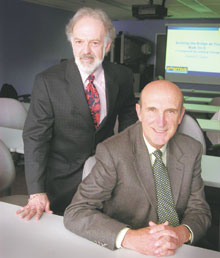Corporate management looks to personal change

Steven Appelbaum and Robert Quinn
Photo by Vincenzo D’Alto
Robert Quinn gave a lecture on organizational change management to the John Molson School of Business, but it was all about you and me. He said we change the world by changing ourselves.
Quinn is from the University of Michigan Business School. He writes his own books on leadership and trust, notably Deep Change, which is based on the principles of Gandhi and Martin Luther King and their roles as change agents in the world.
“People e-mailed me to say, ‘I read your book and used it to reorganize the U.S. Army’, or ‘I read your book and used it to get through my divorce.’” Their stories helped me come up with new ideas on the process of change.”
In sociology, he said, we look first at norms, and then at negative social deviance, but we should look at the positive deviants sitting at the far right of the curve.
“We live in a reactive state, tending to take the path of least resistance. We’re also externally directed – very preoccupied with what others think of us — and so we remain in our comfort zones, ignoring signals for change.”
He demonstrated this by asking one unsuspecting audience member to stand up and sing. His discomfort was sensed throughout the room.
“Instead of asking ‘How do I get what I want?,’” Quinn said, “try ‘What result do I want to create?’” Step out of that comfort zone.
Professor Steven Appelbaum, the organizer of Quinn’s talk, was delighted, because Quinn’s approach validated his own teaching.
He said after the talk, “I sometimes receive negative remarks at times about the comments I intersperse in my OB lectures about my family and kids, but most students say, ‘Yes! That happened to me. Now I can understand the principles.’”
Twenty years ago, Appelbaum taught only the principles, the how of things. “‘Here’s the cookbook,’ I would say.
“Then, about eight years ago, I woke up and started teaching differently, using experiences and role-play scenarios. I was taking the real world and making it the curriculum. Now I still teach the theory, but as it applies to people’s reactions and sentiments. That is how they really learn.”
Appelbaum’s student feedback improved exponentially. Not long after that, he received two outstanding teaching awards from the JMSB in 1994 and 1999.
Twenty years ago, when he was dean of the JMSB for seven years, Appelbaum suggested an executive MBA program at Concordia. He encountered opposition, but Concordia now has the longest-running EMBA program in Canada.
Appelbaum was named to the Hall of Fame of his high school in Philadelphia where he will address the alumni next month. He was not the “ideal student,” he admitted.
“As I listened to Dr. Quinn’s presentation, it hit me. I was one of those positive deviants who had to pay a heavy price for many years for working out of the comfort zone.”
Quinn teaches a one-week class in transformational leadership, and guarantees his students will leave as transformed individuals.
Appelbaum said, “He talks about how you have to deal first with the internal being in order to have an impact on an organization. He forces you to look at yourself from the outside. That’s the magic.”
Quinn was the second speaker in a series presented by the Concordia University Research Chair in Organizational Development, which Professor Appelbaum holds.